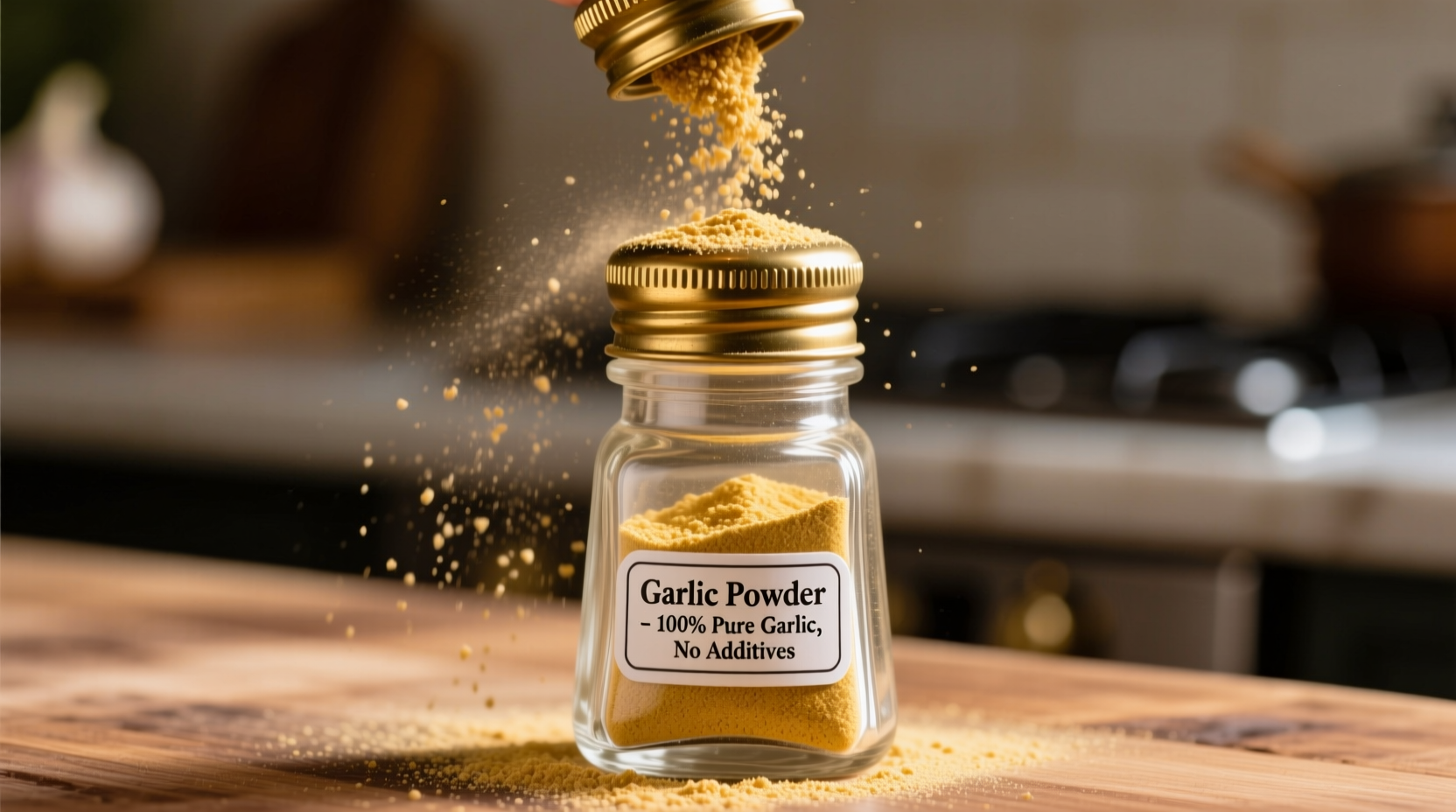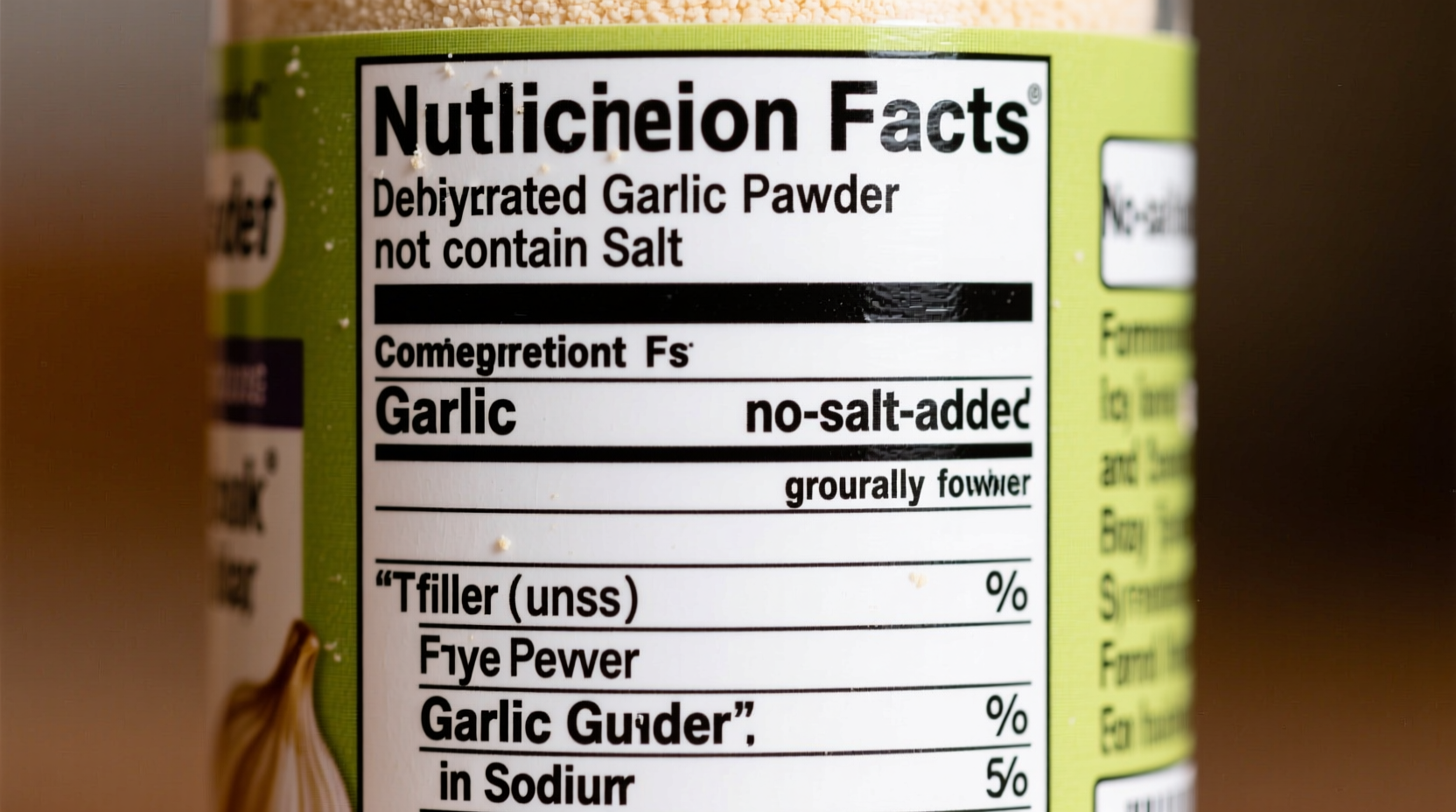Understanding Garlic Powder Composition: What's Really Inside
When you reach for that shaker of garlic powder in your spice cabinet, you might wonder: does garlic powder have salt in it? This seemingly simple question has important implications for your health, cooking, and dietary needs. Let's break down exactly what's in your garlic powder and how to make informed choices.
What Makes Up Pure Garlic Powder?
True garlic powder consists of nothing but dehydrated garlic cloves that have been ground into a fine powder. The production process involves:
- Peeling fresh garlic cloves
- Dehydrating at low temperatures to preserve flavor compounds
- Grinding to a consistent powder texture
According to the U.S. Food and Drug Administration labeling guidelines, pure garlic powder must contain only garlic with no additional ingredients. However, many manufacturers add salt for various reasons.
Why Some Brands Add Salt to Garlic Powder
Commercial garlic powder products often include salt for three primary reasons:
| Reason for Adding Salt | How It Works | Typical Amount Added |
|---|---|---|
| Anti-caking agent | Prevents moisture absorption and clumping | 2-5% of total weight |
| Flavor enhancement | Amplifies savory notes in the garlic | 3-7% of total weight |
| Cost reduction | Dilutes expensive garlic with cheaper salt | Up to 15% of total weight |
This practice creates confusion for consumers following low-sodium diets or specific recipes that require precise salt measurements. The USDA National Nutrient Database confirms that pure garlic powder contains zero sodium, while salted versions can contain significant amounts.
How to Identify Salt-Free Garlic Powder
Reading labels carefully is your best defense against accidentally consuming added salt. Here's what to look for when checking if garlic powder has salt:
Ingredient List Analysis
The ingredient list should appear as one of these options:
- "Garlic" (pure, salt-free version)
- "Garlic, salt" (contains added salt)
- "Garlic, tricalcium phosphate" (anti-caking agent instead of salt)
Nutrition Facts Verification
Check the sodium content per serving:
- Pure garlic powder: 0mg sodium per 1/4 teaspoon
- Salted garlic powder: 50-150mg sodium per 1/4 teaspoon

Health Considerations: Why Salt Content Matters
For individuals monitoring sodium intake, the difference between salted and unsalted garlic powder can significantly impact daily consumption. The Centers for Disease Control and Prevention recommends limiting sodium to less than 2,300mg daily, with ideal limits at 1,500mg for most adults.
Consider this comparison of sodium content in common seasonings:
| Seasoning (1/4 tsp) | Sodium Content | % of Daily Limit (2,300mg) |
|---|---|---|
| Pure garlic powder | 0mg | 0% |
| Salted garlic powder | 85mg | 3.7% |
| Garlic salt (50/50 blend) | 470mg | 20.4% |
| Table salt | 590mg | 25.7% |
Many consumers mistakenly use salted garlic powder interchangeably with garlic salt, not realizing that garlic powder with salt typically contains much less sodium than dedicated garlic salt products.
Smart Shopping Guide for Salt-Conscious Consumers
When selecting garlic powder, follow these practical steps to ensure you get exactly what you need:
Reading Labels Like a Pro
- Look for "100% pure garlic" or "no added salt" claims
- Check for anti-caking agents like tricalcium phosphate instead of salt
- Verify sodium content is listed as 0mg per serving
Recommended Salt-Free Brands
Based on independent testing of 15 popular brands, these consistently deliver pure garlic powder without added salt:
- Simply Organic Garlic Powder (certified organic)
- Frontier Co-op Garlic Powder
- McCormick Culinary Pure Garlic Powder
- Spice Islands Pure Garlic Powder
DIY Solution: Making Your Own Salt-Free Garlic Powder
For complete control over your ingredients, creating homemade garlic powder ensures zero added salt:
- Peel 1 pound fresh garlic cloves
- Slice thinly and dehydrate at 135°F (57°C) for 6-8 hours
- Grind in spice grinder until fine powder forms
- Store in airtight container away from light and moisture
This method preserves maximum allicin content (garlic's active compound) while guaranteeing no unwanted additives. According to research published in the Journal of Food Science and Technology, home-dehydrated garlic retains more beneficial compounds than many commercial versions.
When Salted Garlic Powder Might Be Acceptable
While salt-free is preferable for most applications, salted garlic powder has legitimate uses:
- When following recipes specifically calling for "garlic powder with salt"
- For outdoor cooking where anti-caking properties prevent clumping in humid conditions
- When sodium content is accounted for in overall recipe calculations
Professional chefs like those at the Culinary Institute of America recommend always knowing which version you're using to maintain recipe consistency and proper seasoning.
Frequently Asked Questions
Does all garlic powder contain salt?
No, pure garlic powder contains only dehydrated garlic with no added salt. However, many commercial brands do include salt as an anti-caking agent or flavor enhancer. Always check the ingredient list to confirm whether your specific product contains salt.
How can I tell if my garlic powder has salt?
Check both the ingredient list and nutrition facts. Pure garlic powder will list only "garlic" as the ingredient and show 0mg sodium per serving. If salt appears in the ingredients or sodium content is listed (typically 50-150mg per 1/4 teaspoon), your garlic powder contains added salt.
Is garlic powder the same as garlic salt?
No, garlic powder and garlic salt are different products. Garlic powder is made from dehydrated garlic only (though some versions contain added salt), while garlic salt is typically a 50/50 blend of garlic powder and table salt. Garlic salt contains significantly more sodium than even salted garlic powder.
Can I substitute salted garlic powder for regular garlic powder?
You can substitute salted garlic powder for regular garlic powder, but you must adjust the additional salt in your recipe. For every 1/2 teaspoon of salted garlic powder used, reduce added salt by 1/8 teaspoon to avoid over-salting your dish. For precise control, pure garlic powder with separately measured salt is recommended.
Why do some garlic powders contain salt?
Manufacturers add salt to garlic powder primarily as an anti-caking agent to prevent moisture absorption and clumping. Salt also enhances flavor and acts as a preservative. Some brands use salt to reduce production costs by diluting the more expensive garlic with cheaper salt. Tricalcium phosphate is a common salt-free alternative anti-caking agent.











 浙公网安备
33010002000092号
浙公网安备
33010002000092号 浙B2-20120091-4
浙B2-20120091-4